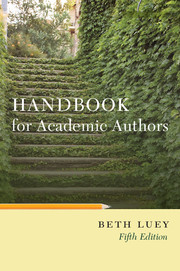Book contents
- Frontmatter
- Contents
- Illustrations
- Preface to the Fifth Edition
- Preface to the Fourth Edition
- Preface to the Third Edition
- Preface to the Second Edition
- Preface to the First Edition
- Chapter 1 The Publishing Partnership
- Chapter 2 Journal Articles
- Chapter 3 Revising a Dissertation
- Chapter 4 Finding a Publisher for the Scholarly Book
- Chapter 5 Working with Your Publisher
- Chapter 6 Multiauthor Books and Anthologies
- Chapter 7 Finding a Publisher for the College Textbook
- Chapter 8 Working with Your Textbook Publisher
- Chapter 9 Books for General Readers
- Chapter 10 The Mechanics of Authorship
- Chapter 11 Costs and Prices
- Chapter 12 Born Digital
- Bibliography
- Index
Chapter 6 - Multiauthor Books and Anthologies
Published online by Cambridge University Press: 02 December 2010
- Frontmatter
- Contents
- Illustrations
- Preface to the Fifth Edition
- Preface to the Fourth Edition
- Preface to the Third Edition
- Preface to the Second Edition
- Preface to the First Edition
- Chapter 1 The Publishing Partnership
- Chapter 2 Journal Articles
- Chapter 3 Revising a Dissertation
- Chapter 4 Finding a Publisher for the Scholarly Book
- Chapter 5 Working with Your Publisher
- Chapter 6 Multiauthor Books and Anthologies
- Chapter 7 Finding a Publisher for the College Textbook
- Chapter 8 Working with Your Textbook Publisher
- Chapter 9 Books for General Readers
- Chapter 10 The Mechanics of Authorship
- Chapter 11 Costs and Prices
- Chapter 12 Born Digital
- Bibliography
- Index
Summary
I never could understand how two men can write a book together; to me that's like three people getting together to have a baby.
Evelyn WaughMultiauthor books are of two sorts: collections of original essays and anthologies of previously published material. The first sort of collection is usually published by a university press or other scholarly publisher; it includes festschrifts, symposium proceedings, and commissioned volumes on current topics. The specialized reference work is an especially complex variant. Although such books may occasionally include one or two articles that have been published elsewhere, most of the material must be original. The second sort of collection is most often prepared for use as a required or supplementary text for a course and is usually published by a textbook publisher. Some such anthologies, however – especially of literature and translations – are published by scholarly publishers. Because each sort of volume is prepared very differently, this chapter discusses them separately. In each case, the compiler must deal with legal or contractual problems, editorial problems, and mechanical problems. The chapter is written mainly for the volume editor or compiler, but contributors to such volumes will also find it useful.
Collections of Original Essays
Compiling and editing a collection of scholarly articles can be one of the most nerve-racking experiences of a lifetime. You are dealing with multiple egos, multiple addresses, multiple problems, multiple missed deadlines, and multiple tempers. You must negotiate between the publisher and the contributors, and that can be very difficult.
- Type
- Chapter
- Information
- Handbook for Academic Authors , pp. 107 - 122Publisher: Cambridge University PressPrint publication year: 2009



